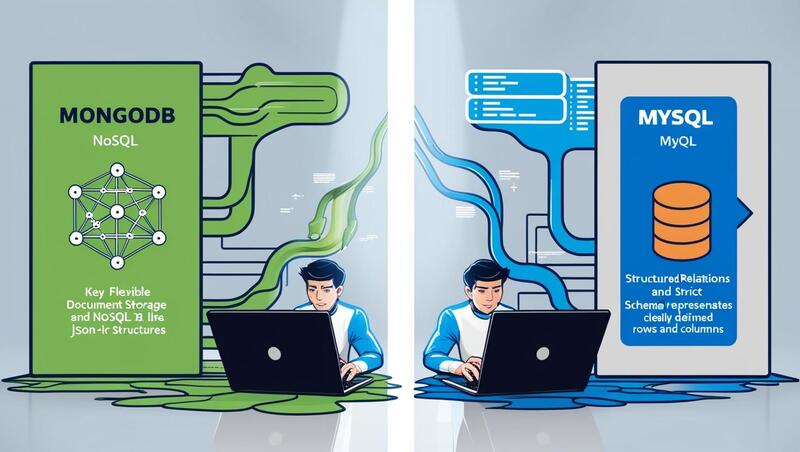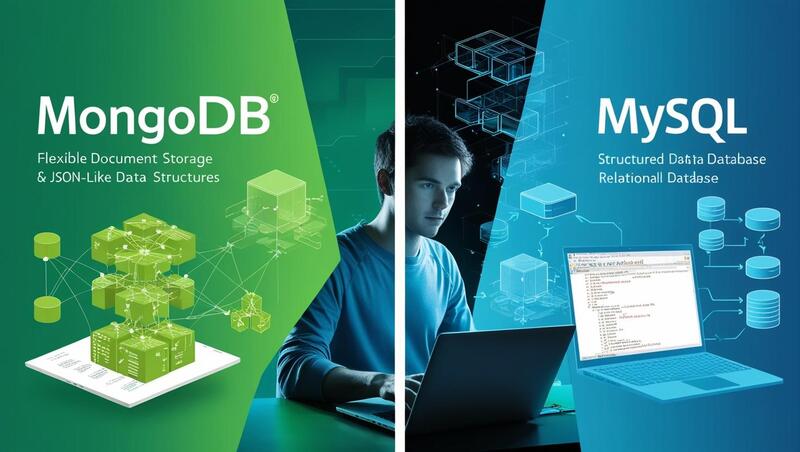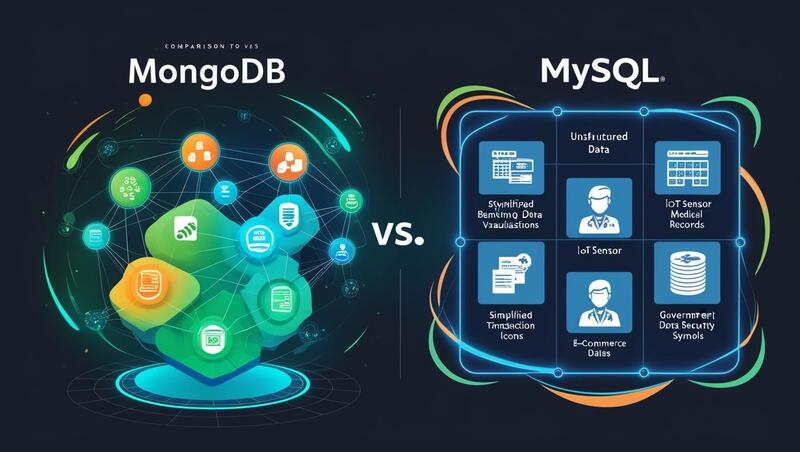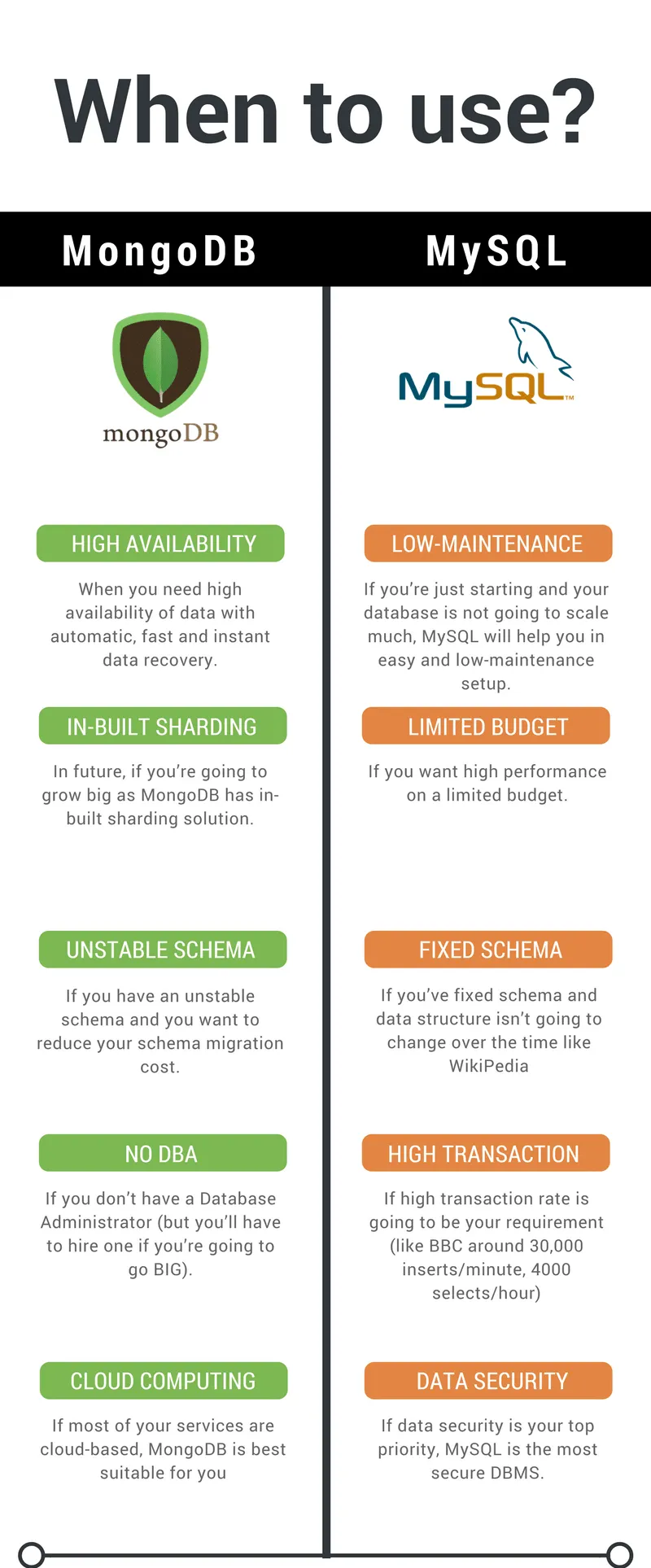Databases store and manage data. They help websites and apps run smoothly. Over 92% of websites use a database. Databases handle user accounts, payments and content.
Choosing the right database improves speed, security and scalability. For example, Facebook uses multiple databases like MongoDB to handle 350 million photo uploads daily. Small businesses may use MySQL for structured data. A poor choice can slow performance. For instance, Amazon handles 600 sales per second using scalable databases.
So what are MongoDB vs MySQL Databases? They also help businesses manage information efficiently. A relational database like MySQL ensures data consistency using ACID properties. MongoDB, a NoSQL database, offers schema flexibility and JSON storage for unstructured data. Performance depends on data structure and query language.
In this article, we will be discussing MongoDB vs MySQL – the key difference between MongoDB and MySQL. Side by side we will also look into the benefits of MongoDB over MySQL as well as when to use MongoDB and when to use MySQL. Let’s start:
What is MongoDB?
MongoDB is a NoSQL database. It stores data as flexible JSON (JavaScript Object Notation) like documents. Over 31,000 companies use MongoDB, including eBay and Adobe. It handles large, unstructured data efficiently. It supports horizontal scaling, meaning it distributes data across multiple servers. This improves speed and performance.
MongoDB processes 100,000+ queries per second in high-traffic applications. It is great for big data, real-time apps and IoT. Example: Uber uses MongoDB to manage millions of real-time ride requests.
What is MySQL?

MySQL is a relational database. It organizes data in structured tables. Over 50% of databases worldwide use MySQL. It follows SQL (Structured Query Language) for managing data. It is best for applications needing strong relationships between data.
MySQL powers Facebook, Twitter and YouTube. It handles billions of queries daily with high security. Example: PayPal uses MySQL to manage 300+ million user transactions securely. It is ideal for banking, e-commerce and government records.
Also Read: Laravel vs NodeJS
MongoDB and MySQL Compared Feature-wise:
Please check the table below for a detailed feature-wise comparison of MongoDB and MySQL.
| Feature | 🟢 MongoDB (NoSQL) | 🔵 MySQL (SQL) |
| 📂 Database Type | NoSQL (Document-oriented) | SQL (Relational) |
| 📊 Data Model | Flexible schema with collections and documents | Structured data with tables and rows |
| 📝 Query Language | MongoDB Query Language (MQL) | Structured Query Language (SQL) |
| 📈 Scalability | Horizontal scaling (sharding) | Vertical scaling (replication & clustering) |
| ⚡ Performance | High performance with large datasets | Excellent for complex queries & joins |
| ✅ Data Integrity | Eventual consistency (no full ACID compliance) | Strong consistency with full ACID compliance |
| 📜 Schema | No predefined schema; flexible schema design | Fixed schema with predefined tables & columns |
| 🔄 Transactions | Limited multi-document transaction support | Full ACID support for multi-row transactions |
| 🎯 Use Cases | Big Data, CMS, Real-time Analytics | Banking Systems, E-commerce, Enterprise Applications |
| 🔁 Replication | Replica sets for high availability | Master-slave replication |
| 📌 Indexing | Supports various indexes (hashed, compound) | Supports various indexes (primary, unique, full-text) |
Key Differences Between MongoDB and MySQL
Each database is best suited for different use cases. MongoDB is ideal for scalable, flexible applications, while MySQL ensures data consistency and security.
1. Database Structure:

MongoDB is a NoSQL database that stores data as documents inside collections. It is like storing different types of notes in separate folders. MySQL, a relational database, organizes data in structured tables. In simple words the difference between MongoDB and MySQL, the latter is like an Excel sheet with fixed columns.
MongoDB Vs MySQL Example- It can be best explained by social media platforms like Twitter. Benefits of MongoDB over MySQL come in where Twitter posts have different attributes. Thus, Twitter takes advantage of MongoDB’s flexible structure. A banking system, requiring strict relationships between accounts, fits MySQL.
2. Data Storage Model:
MongoDB uses BSON (Binary JSON), allowing arrays and nested documents. MySQL uses a traditional row-column format. So when to use MongoDB and when to use MySQL?
Example- In an e-commerce app, MongoDB can store product details as a document with various attributes (color, size, brand). Here the difference between MongoDB and MySQL, is that the MySQL would store each attribute in a separate table, requiring multiple joins to retrieve all details.
3. Schema Flexibility:

MongoDB vs MySQL performance – MongoDB is schema-less, meaning each document can have different fields. MySQL requires a predefined schema.
MongoDB Vs MySQL Example- A blogging platform where each article can have different metadata (author, images, tags) works well with MongoDB. A payroll system that needs uniform fields (salary, tax, employee ID) is best in MySQL.
4. Scalability:
MongoDB scales horizontally (sharding), distributing data across multiple servers. MySQL scales vertically (adding CPU/RAM). So when to use MongoDB and when to use MySQL?
Example – Amazon, handling millions of transactions daily, uses MongoDB for scalable performance. A small business inventory system may rely on MySQL without needing multiple servers.
5. MongoDB vs MySQL Performance & Speed:

The key benefit of MongoDB over MySQL is that the former is faster for high-volume reads/writes, while MySQL is better for complex queries.
MongoDB Vs MySQL Example – A ride-sharing app like Uber benefits from MongoDB’s speed. A stock trading app, requiring precise transactions, prefers MySQL.
6. Query Language:
Another difference between MongoDB and MySQL is that MongoDB uses MQL (JSON-based). On the other hand, MySQL uses SQL.
Example – A real-time analytics dashboard benefits from MongoDB’s flexible queries. A hospital management system uses MySQL for strict relational queries.
7. Security Features:
Both databases offer authentication and encryption. MySQL has built-in encryption, while MongoDB needs extra configuration.
MongoDB Vs MySQL Example – A banking app prefers MySQL for its strong encryption. A gaming leaderboard, prioritizing speed, benefits from MongoDB.
Also Read: What is the Best Way to Hire Full Stack Developers?
When to Use MongoDB and When to Use MySQL?

Use MongoDB when:
- Data is unstructured or changes often. An example is a social media app storing posts, comments and reactions in different formats.
- High-speed read and write operations are needed. Example is real-time analytics for an IoT system.
- Scalability is important. For Example the E-commerce platforms handling millions of users.
Use MySQL When:
- Data needs strict relationships. Example is the banking systems managing accounts and transactions.
- Complex queries and joins are required. Excellent example would be the Hospital databases tracking patient records.
- Security and data integrity are critical. Worthy example is the government databases storing citizen data.
Which Database Should You Choose?
In 2024, the relational database market reached $74.09 billion, projected to grow to $83.98 billion in 2025. Oracle leads the market, with MySQL and Microsoft SQL Server also among the top five databases. Cloud-based databases are expected to reach $123.4 billion by 2032, growing at a CAGR of 20.6%. So if you wish to know more on MongoDB vs MySQL which ones will suit your business? Or when to use MongoDB and when to use MySQL for the same business that you are running? Then do contact us, our experts will guide you at every step of the process.
FAQs:
MongoDB is a NoSQL document-oriented database, while MySQL is a relational database (RDBMS) that stores data in tables with structured schema.
MongoDB offers faster query execution for unstructured data and big data applications, while MySQL performs better with complex joins and structured queries.
No, MongoDB uses the MongoDB Query Language (MQL) instead of SQL, making it more flexible for handling unstructured and semi-structured data.
MySQL organizes data in tables with predefined schemas, enforcing relationships through primary keys and foreign keys for structured data management.
MongoDB stores data in BSON (Binary JSON) documents, which allows for schema flexibility and nested data structures.
MongoDB is preferred for big data and real-time analytics due to its ability to handle large-scale distributed data efficiently.
MySQL does support JSON data types, but it lacks the schema flexibility and scalability of a true NoSQL database like MongoDB.
MySQL is widely used in banking, e-commerce, and enterprise applications, where structured data integrity is crucial.
MongoDB is popular in IoT, content management, and real-time applications, where scalability and schema flexibility are essential.
Yes, hybrid solutions use both databases, where MongoDB handles unstructured data and MySQL manages relational data for efficient processing.
Yes, MongoDB supports cloud-based deployments like MongoDB Atlas, offering seamless database-as-a-service (DBaaS) scalability.

Sanjay Modasia
Sanjay Modasia is Founder & Managing Director at LogicRays Technologies. He has spent the last six years bringing evolution in technology through serving his expertise in Web & App Development using top technological skills like Python/ Django Development, Artificial Intelligence & Machine Learning, Data Science, Vue JS, AngularJS, and React JS.Sanjay brings a new perspective with Web & App Development in every technology he comes by. With the help of his technical skills, he is bringing change by helping startups and businesses grow on a large scale. His management and technological abilities have greatly benefited the organisation.
Subscribe To Our
Newsletter
Know The Technology!
Sign up today!

